- Home
- M. K. Hume
M. K. Hume [King Arthur Trilogy 04] The Last Dragon Page 2
M. K. Hume [King Arthur Trilogy 04] The Last Dragon Read online
Page 2
Rhys ap Myrddion Son of Myrddion and Nimue, and brother of Taliesin. He is a famed swordsmith and ironmonger.
Scoular ap Seosamh King of the Brigante, who replaces Modred after the latter’s death at Camlann.
Septimus Cardinal. He took Lorcan to Rome and seduced him. The young Lorcan eventually killed him.
Stormbringer A Danish captain who captures Arthur and his travelling party. His name is an alias.
Taliesin Son of Myrddion and Nimue. He champions Prince Arthur.
Tewdwr Son of Ifor and father of Mareddyd.
Trefor A warrior from King Bors’s cavalry who accompanies Arthur on the journey from Tintagel to Onnum.
Trystan (Lord) Spymaster for King Artor. Lover of Queen Iseult. Killed and beheaded by King Mark for seducing his queen.
Uther Pendragon The son of Constantine III and the brother of Constans II and Ambrosius Aurelianus, all of whom were to become High Kings of the Britons. Constans II was succeeded in turn by Vortigern, Ambrosius, Uther and Artor. Uther, in company with Ambrosius, returned to Britain after many years in exile.
Valda Wife of King Bors Minor of Cornwall. She is of the hill people.
Wenhaver (Queen) Second wife of King Artor, High King of the Britons.
Wlencing Son of Aelle, one of the thanes of the Southern Saxons.
Ygerne Ygerne is the wife of Gorlois, the Boar of Cornwall. After his death, she marries Uther Pendragon. She is the natural mother of King Artor.
PROLOGUE
When passions come upon men in strength beyond measure, their gift is neither one of glory nor of greatness.
Euripides, Medea, c.431 BC
‘Beware, children of Don, for the storm has come upon you and caught you unawares. Hide your faces in your cloaks and rend your tunics with your breast pins, for the Great Hunt is come and Cernunes with his stag’s antlers harrows the skies and sets his hounds upon the children of Don. Blood and death ride on his storm, so your puny vaingloriousness will not save you.’
An old woman, a hermit by her long white hair and the skins that wrapped her thin, raddled body, stood upon the cracked pedestal in the marketplace of Mamucium, and her deep voice floated over the crowd of warriors, women and traders. Amid the hurly-burly of hawkers and touts, the cries of animals and the loud chatter of customers, the old woman should have been just one more oddity in the crowded marketplace, but her wild, exotic appearance struck men and women dumb with superstitious awe.
Her dirty, begrimed claws were raised upward so that her skeletal arms were exposed to the crowd before her. Her horny feet were also bared, but no man dared to laugh, for any fool could see that she belonged to the goddess in her crone form. With obvious authority she rounded on the warriors in their checked tunics and trews, and her flinty, pale eyes forced them to listen whether they chose to hear her or not.
‘Woe unto you, children of the Brigante tribe, cowardly followers of a treacherous and cursed lord. You raised your swords against your lawful king, and stained Celtic earth with Celtic blood. The goddess has sent me to give you warning, for none of you will be spared in the years to come. You will know you are accursed, and yours will be the blood guilt that must be paid.’
One man, braver than most, climbed onto the shattered remnants of a marble king or god that had once stood on the pedestal in the days when the Roman legions had forced the Celts to obey their brutal, pragmatic rule. With one foot on the statue’s breast and the other on its severed head, he stared the witch woman down and laughed derisively, making a rude, universal gesture of contempt with one hand. The sound of his voice was like the hoarse calling of crows fighting over corpses when a battle is done.
‘Be silent, woman of the darkness! None may insult the warriors of this tribe. We owe allegiance to no one and nothing except our lawful king. So be gone with you and return to your hole in the earth lest we kill you like the toothless serpent you are.’
The younger men laughed nervously but several women pulled at their arms and tried to silence them, while the older, wiser warriors turned their faces away from the old seer’s basilisk stare.
‘Be gone, fool!’ the old woman ordered. Then, by mischance or the goddess’s will, the protesting warrior’s boot slipped on the slick forehead of the sculpture and he almost fell. On one knee, he spat a curse at the old woman, but she was not yet done with him.
‘Carrion will feed on you before three years have passed. Long will your wife search for your corpse, for the Saxons will feed you to their dogs when they finally hunt you down.’
Somewhere in the crowd, a woman wailed in a terrified voice that was high and shrill.
‘Cry, widows. Beg the Mother to save you if you will, but you have slain her favourite, the Child of the Dragon, and she now turns her face away from you.’
The crone spun to face the cluster of warriors who surrounded their fallen brother and they could see that her eyes were filled with madness – or that she was possessed by the goddess. Superstition stilled the hands that had crept towards sword hilts and dried the saliva in their mouths. The eagerness for killing died in their eyes.
‘When King Artor breathed his last, the Celtic kingdoms started to die. Nothing will save you now, not your wide lands, your fair Melandra, your warrior’s swords or the strength of your arms. When you swore allegiance to the Matricide, you poisoned your own blood, and when you raised your swords against your brothers you damned your children to be slaves. The Saxons will devour you in the night, and no magical cup endures that can save you.’
More women began to weep and wail as they were caught up in the hysteria of the crowd. Warriors who had been at Deva, or had seen the Dragon King’s insane charge across the ford, remembered how it felt to be a traitor, until their cheeks were stained with shame.
‘No man is innocent.’ The witch woman’s voice was a whisper, but every person in the crowded, dirty marketplace heard all four words. The silence was absolute as the seer’s message sank into their bones. No excuses would be accepted.
‘Tell your children and your grandchildren, those of you who survive in the wild, high places in the bloody years to come. Do not forget the names of the heroes. Do not forget Modred, the Matricide, and what was done that bloody day when the Celts began their march towards death. You followed a man so crazed by vile ambition that he poisoned his own mother by stealth. And you knew it! You heard the rumours that damned the Matricide for ever – but he promised plunder, broad lands and power so you drowned your honour in the spoiled waters of greed. Warn your children that treachery breeds blood that must be paid before the darkness comes, and perhaps, if she believes you, the Mother will permit some children to survive for the Dragon’s sake. But remember, when the Great Darkness comes and you forsake your heritage and your ancient lands, that the gods will not be mocked, or bargained with, or tempted. You must find some last rags of glory out of your betrayal if any of you are to survive the night that is coming.’
Then, as if the effort of speech had sucked the last blood from her veins, the old woman folded and fell, like a pile of old rags and threadbare furs. When one of the women dared to approach the prone figure, she discovered that the old hermit had breathed her last.
Her feet were scabbed and bloody from the long roads she had travelled, while her hollowed belly spoke of starvation and the travails she had undergone. Her flinty eyes had rolled up into her skull and only the whites could be seen between the swollen red eyelids. Her mouth was almost toothless and her flaccid breasts had surely never been young. Now that the Holy Spirit had deserted her, after having chosen her frail shell to bear the curse and the warning, she was a pathetic old woman once more.
Perhaps the Brigante might still be forgiven for raising their swords against the might of King Artor. Or perhaps they had not earned a moment’s safety in the twilight world they had inherited.
The people of Mamucium remembered the witch woman’s message, and passed it on to every person they met. They repeated the tales of sham
e to their children and grandchildren, and did not spare themselves in the telling. And, like all sensible men and women among their tribe, they turned their eyes to the east. And they waited.
CHAPTER I
RETRIBUTION
This ae nighte, this ae nighte,
– Every nighte and alle,
Fire and flet and candle-lighte,
And Christe receive thy saule.
From Brig o’ Dread when thou may’st pass,
– Every nighte and alle,
To Purgatory fire thou com’st at last;
And Christe receive thy saule.
‘The Lyke-Wake dirge’
When a great king dies, the earth shudders on its axis and even the sun and stars seem less bright and permanent. When King Artor died, no words were sufficient to describe the sudden stutter in the lifeblood of the Celtic nations. There was no time for mourning, only a terror of what would come, now that their protector had perished.
Ultimately, autumn followed a spring and summer of civil war between the Celtic tribes. The farmers obeyed the ancient laws of the earth and harvested their crops, storing grain in neat conical stone and mud granaries, while apples, fish, meat and vegetables were dried and pickled to see out the long winter. Furrows were dug in the bare earth, still crowned with the last dry stalks of an earlier crop, and birds came to feed on worms and beetles disturbed by the wooden ploughs. Careless of the fate of kings, the soil has rhythms that cannot be gainsaid by grief or hardship. Planting, weeding, harvesting and ploughing – the pattern will go on until the end of time.
In Deva, the violated streets and burned buildings still bore raw scars of the conflict that had ravaged a noble Roman city, one that had been an open metropolis for as long as men could remember. Those citizens who had escaped fire and sword crawled out of the rubble and began to set stone on stone and rebuild, for human beings are impelled to labour whenever everything they cherish has been desecrated. Build, destroy, rebuild . . . so the rhythm of cities mimics the patterns of the soil, for the trading ships would come again in the spring, bearing trade goods from the Middle Sea, and the lifeblood of Deva would begin to circle once more. But first, men must mourn their losses.
When the cold winds came, women wept for their empty beds and murdered children, while on Cadbury Tor an empty throne stood in the great hall of King Artor. No man, no matter how powerful or able, dared to rest upon the hard wooden seat. The Celtic warriors who patrolled the Roman roads harried the Picts back to their hollows beyond the Vallum Antonini, where they licked their wounds, smiled below their woad tattoos and waited, knowing that their old hatreds would finally bear fruit. The Warrior of the West had reigned for as long as most men had been alive, and few remembered the chaos of the Great Dragon’s rule when the crazed Uther Pendragon had fought the invading Saxons until old age and madness left him brooding impotently in Venta Belgarum. In those final years of inaction the Saxon barbarians had burned churches and torn down cities of stone before constructing their simple timber buildings and crude palisades in their place.
Later, under King Artor’s long and peaceful rule, the Celtic peoples had prospered, but Artor had died by the hand of his nephew, Modred the Matricide, and no new king had yet been elevated to assume the throne of the Britons.
Pain and loss were followed by collective anger in the rhythm of men’s hearts before hope could finally begin to grow. A rage for all things lost and broken, a fury for the uncertainty of the future and a realisation that the tribes had contributed to their own defeat scoured the spirits of the warriors, leaving a cleaner, brighter anger that demanded to be sated. Still disorganised, the Saxons had not dealt them their mortal blow. But Modred and his allies had killed their future and imperilled their homes, so the traitors must pay before the Celts could begin the healing process. Perhaps a new dragon would rise from dead, cold ashes.
The Matricide was dead. There was no body to display on the walls of Deva, for the High King’s warriors had stabbed, torn, chopped and kicked at it on the battlefield after Artor had dealt the killing blow. Artor’s own body had been spirited away by the three queens and taken down the long road leading to Glastonbury in the south, while his warriors took their bitter chagrin out on the Matricide’s corpse. Modred was gone into the great darkness, and his remains were beyond the justice of his enemies.
But several of Modred’s allies remained alive. They were free, breathing and cowering in hidden places, still hoping to escape the vengeance of the victors of the battle of Camlann. For those men whose anger burned the brightest, the greatest prize became King Mark of the Deceangli tribe, that ruler who had forsaken his oaths of fealty and been seduced by Modred’s empty promises of land and gold. This lordling was assailable, for his body had not been found when the battle was over.
Mark had fled the field when he became aware that Modred had been slain. Whether King Artor survived his wounds or not was of little importance to Mark, who ordered his surviving forces to retire behind their own borders in a hasty and craven retreat. No man, wounded or suffering, was spared during his mad dash to safety. The Deceangli had always prided themselves on the courage of their warriors, and on that numbing, bone-jarring ride the tribesmen cursed their failure on the battlefield and the cowardice of their king, who had determined that they must live for ever with the shame of their flight.
The Deceangli weren’t alone in their shame and impotent anger. The tribes would remember Deva with the taste of wormwood on their tongues and they would dream of vengeance as they searched the north for pockets of Pictish resistance. In ruthless determination to salvage some shreds of honour from the civil war, the kings ground their teeth and vowed that someone would pay for the debacle. Mark knew he was living on borrowed time in his fortress beside the river at Canovium, and prayed that Artor’s death would plunge the kingdoms into chaos. Which, of course, it did.
While Mark was a weak man with a coward’s sense of self-preservation, he understood the frailties and self-delusions of other men. The power vacuum left by Artor’s death weakened the alliance of kings, so each tribal group drew back to its own boundaries and watched its neighbours with untrusting, self-absorbed eyes. Mark wasn’t forgotten, simply put aside until the wounds of his pursuers were cleansed and healing, and the old rhythms could reassert themselves.
For months, Mark hunkered down in the Canovium fortress, which possessed living rock from the heart of the mountains at its back, the river that rose near Dinas Emrys at its feet and huge ramparts of earth protecting his hall at its crown. Canovium had never suffered the ignominy of defeat, for it had been sited with self-defence as the prime consideration.
‘Let them come,’ Mark crowed at those times when he had drunk enough wine to numb his sharp, avian intelligence. ‘They’ll break their backs on my walls. That old bastard Artor is worm food now, so who is left to call me to account? Bedwyr? A Saxon slave in his youth, and now the master of nothing but trees! Gawayne? He’s even older than his damned uncle, and his lands in Rheged are under constant attack from Saxon scum. He’ll not leave his broad acres to settle old scores – not unless he’s got a death wish. Who else is there to care who should live or who should die?’
But, drunk or sober, Mark did not forget the enigmatic king of the Ordovice, a tribe of great power in the west. Bran was said to be linked to the old king by blood, for ancient rumour had suggested that his mother, Anna, was King Artor’s sister, but no man dared ask the question of King Bran outright. Reasoned, quiet and self-effacing on first acquaintance, Bran seemed too mild mannered to be a threat. Yet Mark worried about a steely glint that showed in the younger man’s eyes when he was thwarted, and a natural talent for leadership which was surprising given that quiet demeanour. Mark was sharp and observant, or he would not have survived for so many years, and he recognised the adoration that the Ordovice warriors gave unstintingly to their king. Such worship couldn’t be bought or borrowed: it had to be earned.
But word had come that Bra
n had been dangerously wounded in one of the early battles of Modred’s campaign. Within his hall, Mark hugged himself in the cold and drew comfort from the younger man’s illness. The wound would slow down any intemperate actions on Bran’s part, even though his bitch of a mother had Uther Pendragon’s long memory and was capable of leading a band of her warriors straight to the gates of Canovium. Fortunately, Anna was elderly and her brother was dead. She would be obliged to mourn Artor’s loss.
Endlessly, Mark worried about his own safety as he watched the roads that led from the north and the south. Tortured and lacking the energy to rule, he waited as winter plunged the north into a prison of sleet, snow and black ice.
In those bitter days, the king often laughed or wept until his frightened servants were unable to discern the difference in the ugly sounds that came from his hall. At other times, he was heard talking to the empty chair where his wife had once sat in state, crooning endearments or cursing her vilely by turn. On these occasions, the servants and his personal guard shunned Mark lest he should see the contempt and pity in their eyes, for every soul in the fortress had heard how Queen Iseult, whose name meant fair to look upon, had broken her marriage vows to their king, judging him a lesser man than Lord Trystan, King Artor’s spymaster and sworn servant, and had killed herself in front of her husband.
‘Ah, Iseult, my sweet little bitch, you shouldn’t have forsaken me. Don’t you understand how you were the cause of everything’s going wrong? I’d never have bothered with that madman Modred if it weren’t for you. Why wasn’t I good enough? What did Trystan have that I didn’t? I had no choice but to punish you, and you knew it, woman. Else I’d have been a joke in my own hall. A man, especially a king, can’t allow himself to be cuckolded in his own house.’
It was ten months since King Mark had returned to Canovium, and behind the wall hangings his servants crossed themselves or gripped their amulets with pious fingers as they listened to his crazy ramblings. ‘I pray that our master dies and rots before the other kings turn their faces towards us,’ his seneschal, Mellyr, whispered to the captain of the King’s Guard. ‘They’ll kill us and burn Canovium to the ground if we continue to harbour him.’

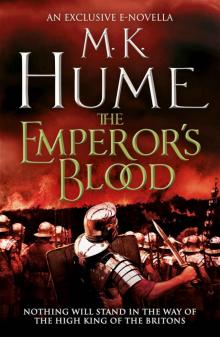 The Emperor's Blood (e-novella)
The Emperor's Blood (e-novella)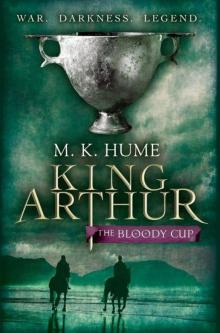 King Arthur: The Bloody Cup: Book Three
King Arthur: The Bloody Cup: Book Three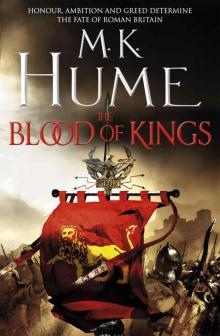 The Blood of Kings: Tintagel Book I
The Blood of Kings: Tintagel Book I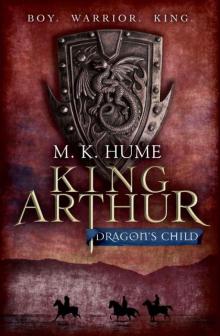 King Arthur: Dragon's Child: Book One (King Arthur Trilogy 1)
King Arthur: Dragon's Child: Book One (King Arthur Trilogy 1)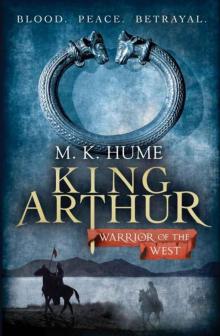 King Arthur: Warrior of the West: Book Two
King Arthur: Warrior of the West: Book Two The Storm Lord
The Storm Lord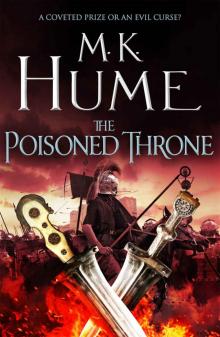 The Poisoned Throne: Tintagel Book II
The Poisoned Throne: Tintagel Book II![M. K. Hume [King Arthur Trilogy 04] The Last Dragon Read online](http://i1.bookreadfree.com/i2/04/07/m_k_hume_king_arthur_trilogy_04_the_last_dragon_preview.jpg) M. K. Hume [King Arthur Trilogy 04] The Last Dragon
M. K. Hume [King Arthur Trilogy 04] The Last Dragon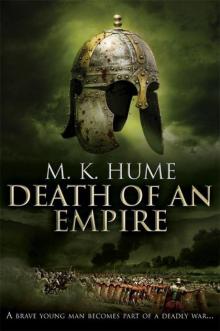 Prophecy: Death of an Empire: Book Two (Prophecy Trilogy)
Prophecy: Death of an Empire: Book Two (Prophecy Trilogy)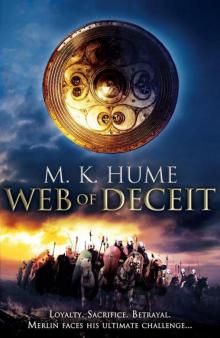 Prophecy: Web of Deceit (Prophecy 3)
Prophecy: Web of Deceit (Prophecy 3)